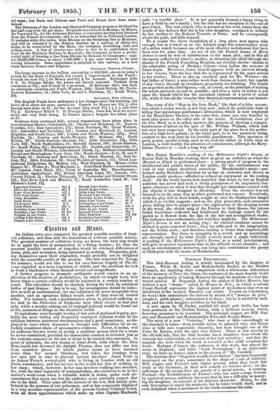Aram nub 311uffir.
An Italian critic once computed the greatest possible number of tragi- cal collisions, and thus laid the foundation of a future possible science. The greatest number of collisions being set down, the next step would be to apply the laws of permutation in a fitting manner ; for thus the greatest possible number of tragedies would be obtained, differences of name, plan, and metaphor, being estimated as nothing. Dramatists, prid- ing themselves upon their originality, would probably not be delighted with the scientific results of the process. The late respected Dr. Young, for instance, would not like to see his once famous tragedy of The Re- venge regarded as a mere repetition of Othello, and the exertions he took to wash a blackamoor white deemed trivial and insignificant.
A further progress in dramatic arithmetic would consist in an ap- plication of the doctrine of probabilities, by which we might learn how many times a certain collision would be repeated in a certain number of years. The calculator should be checked, during his work, by statistical tables of past dramas : that is to say, his investigation should be induc- tive as well as mathematical ; for one collision is far more acceptable than another, and an egregious fallacy would arise if they were all treated alike. For instance, such a predominance given to physical suffering as we find in the Philoetetes of Sophocles most likely occurs in that play only, while a murder arising out of conjugal jealousy would be found one of the commonest things in the theatrical world.
If melodrame were thought worthy of this sort of profound inquiry, pro- bably the most lasting and frequently employed collision would be the collision between untoward circumstances and a good conscience, as dis- played in cases where innocence is brought into difficulties by an un- luckily consistent chain of presumptive evidence. Never, it seems, will an audience become weary of seeing a guiltless person tried for a crime he never committed, provided his immaculate conduct is revealed just as the extreme sentence of the law is about to be carried into execution. In point of principle, the new drama of Janet Pride, with which Mr. Dion Boureicrault has favoured the Adelphi Theatre, does not differ one iota from countless pieces in which justice seems to have assumed more than her normal blindness, but takes the bandage from her eyes just in time to prevent serious mischief. Janet Pride is an honest French servant-girl, who is living in London with an old Swiss watchmaker, and has "no vice in the world but that of walking in her sleep; which, however, in her case involves walking into mischief, for, with the fatal ingenuity of somnambulism, she contrives to be in her master's work-room when a valuable watch is stolen, under such cir- cumstances that every one but the audience must naturally suspect that she is the thief. Then come all the horrors of the law, first faintly sym- !lazed in the persons of two policemen, and at last pompously displayed in a very accurate representation of the present Central Criminal Court, With all those appurtenances which make up what Captain Macheath
calls " a terrible show." It is not generally deemed a happy thing to have a thief in one's family ; but the rule has an exception in the case of poor Janet. The real culprit, who is present at her trial, learns from the words of her defence that she is his own daughter, consigned in infancy by her mother to the Enfants Trouves at Paris; and he consequently avows his guilt, and kills himself.
To a reader the above foundation of a long piece may appear trite enough, but as worked up on the Adelphi stage this commonplace story of a stolen watch becomes one of the most effective melodramas that have been seen for some time. An act of the old French drams of Marie Jeanne is used by way of introduction to the main plot ; and in this all the agony suffered by Janet's mother, in thrusting her child through the shutter of the French Foundling Hospital, are forcibly shown—thanks to the admirable acting of Madame Celeste—long before the sorrows of Janet begin. Moreover, Janet herself appears with an interest already in her favour, from the fact that she is represented by the same actress as her mother. There is also an excellent part for Mr. Webster—the bad father of Janet, a man rather weak than vicious at heart, but capable of any crime, through an inordinate propensity for drinking. The details are as perfect as the chief figures,—all, of course, on the principle of making the whole spectacle as real as possible ; and thus a story in action is put upon the boards which has the sustained interest of a novel of actual life, while it has all the vivacity that theatrical representation can bestow.


































 Previous page
Previous page